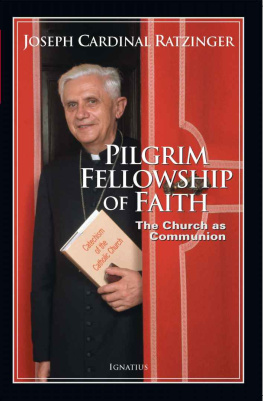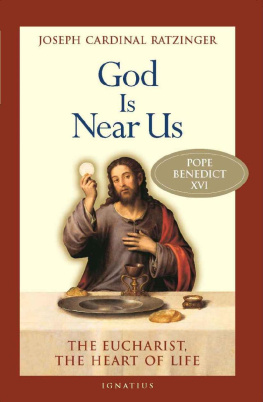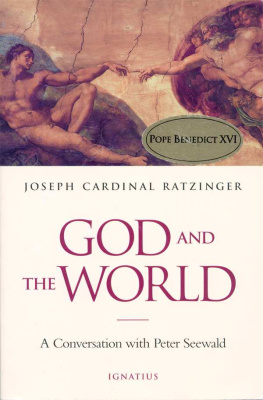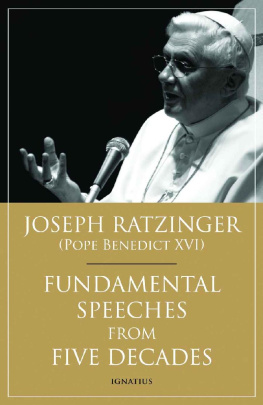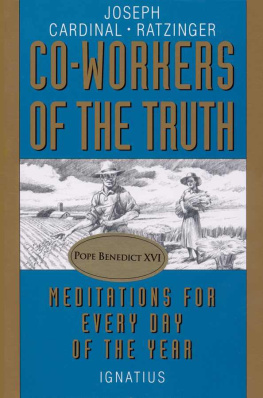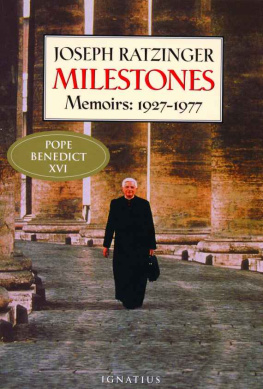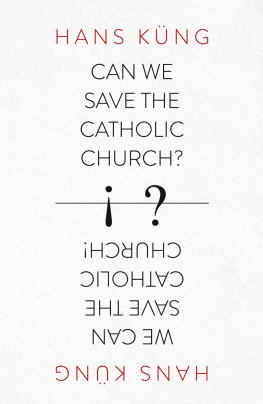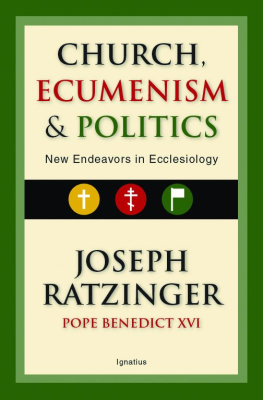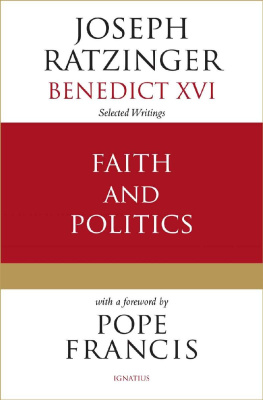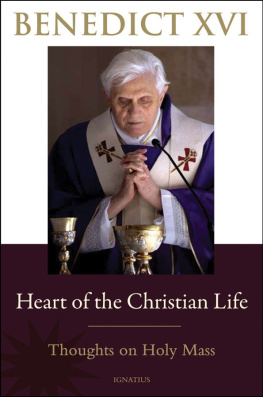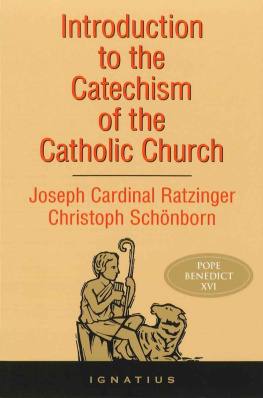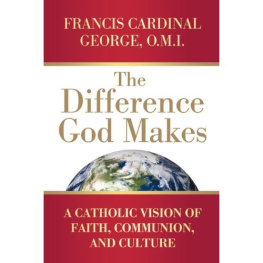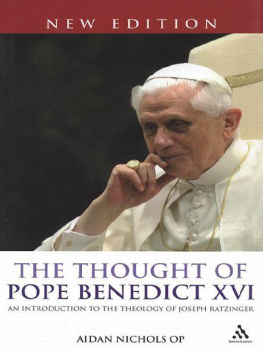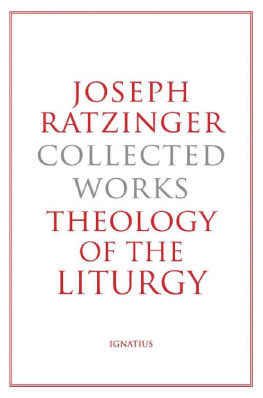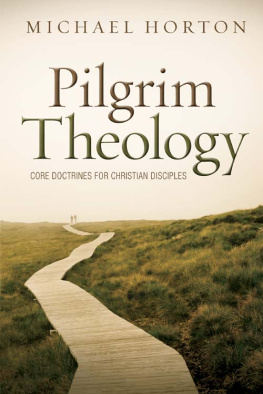Joseph Ratzinger - Pilgrim Fellowship of Faith: The Church as Communion
Here you can read online Joseph Ratzinger - Pilgrim Fellowship of Faith: The Church as Communion full text of the book (entire story) in english for free. Download pdf and epub, get meaning, cover and reviews about this ebook. year: 2005, publisher: Ignatius Press, genre: Religion. Description of the work, (preface) as well as reviews are available. Best literature library LitArk.com created for fans of good reading and offers a wide selection of genres:
Romance novel
Science fiction
Adventure
Detective
Science
History
Home and family
Prose
Art
Politics
Computer
Non-fiction
Religion
Business
Children
Humor
Choose a favorite category and find really read worthwhile books. Enjoy immersion in the world of imagination, feel the emotions of the characters or learn something new for yourself, make an fascinating discovery.
- Book:Pilgrim Fellowship of Faith: The Church as Communion
- Author:
- Publisher:Ignatius Press
- Genre:
- Year:2005
- Rating:5 / 5
- Favourites:Add to favourites
- Your mark:
- 100
- 1
- 2
- 3
- 4
- 5
Pilgrim Fellowship of Faith: The Church as Communion: summary, description and annotation
We offer to read an annotation, description, summary or preface (depends on what the author of the book "Pilgrim Fellowship of Faith: The Church as Communion" wrote himself). If you haven't found the necessary information about the book — write in the comments, we will try to find it.
Joseph Ratzinger: author's other books
Who wrote Pilgrim Fellowship of Faith: The Church as Communion? Find out the surname, the name of the author of the book and a list of all author's works by series.
Pilgrim Fellowship of Faith: The Church as Communion — read online for free the complete book (whole text) full work
Below is the text of the book, divided by pages. System saving the place of the last page read, allows you to conveniently read the book "Pilgrim Fellowship of Faith: The Church as Communion" online for free, without having to search again every time where you left off. Put a bookmark, and you can go to the page where you finished reading at any time.
Font size:
Interval:
Bookmark:
PILGRIM FELLOWSHIP OF FAITH
Joseph Cardinal Ratzinger
THE CHURCH AS COMMUNION
Presented by
the Association of the Former Students of
Joseph Cardinal Ratzinger
in celebration of his
seventy-fifth birthday
Edited by
Stephan Otto Horn
and
Vinzenz Pfnr
TRANSLATED BY HENRY TAYLOR
IGNATIUS PRESS SAN FRANCISCO
Title of the German original:
Weg Gemeinschaft des Glaubens: Kirche als Communio
2002 by Sankt Ulrich Verlag GmbH, Augsburg
Cover art: Image copyright Grzegorz Galazka / CORBIS
Cover by Riz Boncan Marsella
2005 by Ignatius Press, San Francisco
All rights reserved
ISBN 0-89870-963-6
Library of Congress Control Number 2004114955
Printed in the United States of America
Address on the occasion of the conferring of an honorary doctorate in theology by the Theological Faculty of Wroctaw / Breslau
Expression of thanks for the conferring of the degree of Doctor honoris causa at the Faculty of Theology of the University of Navarre in Pamplona
On the relationship between pneumatology and spirituality in the writings of Augustine
1. The Name Holy Spirit as Indicating the Particular Nature of the Third Person of the Trinity
2. The Holy Spirit as Love
3. The Holy Spirit as Gift
4. Opening Up to Salvation History
I. The key to our subject: the word (koinonia)communion
1. The Description of the Church in Acts 2:42
2. The Juristic, Sacramental, and Practical Content of Communion in Acts 2:42 and Galatians 2:9-10
3. The Profane Roots of the Concept of ( koinonia ) and Their Significance for the New Christian Reality: (a) The reshaping of the profane meaning in the Gospel of Luke; (b) The Jewish root; (c) The Greek root and the problem of the Hellenization of Christianity
II. EucharistChristologyEcclesiology: The christological center of our theme
1. Eucharist and Christology
2. The Communion in Christ of Being God and Being Man
3. The Problem of the Excommunicated
Concluding remarks
Preliminary thoughts about Eucharist and mission
I. The theology of the Cross as the presupposition and basis of eucharistic theology
II. Eucharistic theology in the First Letter to the Corinthians
1. 1 Corinthians 5:6: The Christian Pascha
2. 1 Corinthians 6:12-19: Uniting Oneself to the Lord
3. 1 Corinthians 10:1-22: One Body with Christ, but without Any Magical Guarantee of Salvation
4. 1 Corinthians 11:17-33: The Institution of the Eucharist and the Right Way to Celebrate It
III. Martyrdom, Christian life, and apostolic service as ways of living out the Eucharist
1. Martyrdom as a Way in Which the Christian Can Become a Eucharist
2. Worship Consistent with the LogosChristian Living as a Eucharist
3. Mission as Service in the Cosmic Liturgy
Concluding reflections: The Eucharist as the source of mission
Preliminary reflections on the questions involved
1. On the Nature of the Priestly Office: (a) laying a christological foundation; (b) development in the tradition (Augustine)
2. Christology and Ecclesiology: The Ecclesial Character of the Priesthood
3. Spiritual Applications
Prospect: The unity of Old and New Testaments mediated by Christology
I. Attempts at clarifying the question through a dialectic of principles
1. Institution and Charisma
2. Christology and Pneumatology
3. Hierarchy and Prophecy
II. The perspectives of history: Apostolic succession and apostolic movements
1. Universal and Local Offices
2. Apostolic Movements in the History of the Church
3. The Breadth of the Concept of Apostolic Succession
III. Distinctions and yardsticks
In the press conference room of the Holy See, on September 5th, 2000
About the Declaration by the Congregation for the Doctrine of the Faith Dominus Iesus and about the Note by the Congregation for the Doctrine of the Faith Sister Churches
About the communication from the Congregation for the Doctrine of the Faith to the bishops of the Catholic Church , On Some Aspects of the Church Understood as Communion, of May 28, 1992
The classical model of ecumenism
A new ecumenical paradigm ?
The path of ecumenism today and tomorrow
A final reflection: Solovievs vision of eschatological unity
Presentation of the document Remembrance and Reconciliation from the International Theological Commissio
Preliminary remarks
I. Separate publications
II. J. Ratzinger as editor or co-editor
III. Pieces in collective works and periodicals
IV. Articles in works of reference
On the sixteenth of April this year [2002], Joseph Cardinal Ratzinger will have completed seventy-five years of his life.
For his sixtieth birthday, the association of his former students published a comprehensive two-volume Festschrift under the title of Weisheit GottesWeisheit der Welt , in which seventy-seven authors from the sphere of the theologian Joseph Ratzingers academic teaching witnessed to their indebtedness.
For his seventieth birthday, the association of former students published a collection of texts from four decades, under the title Vom Wiederauffinden der Mitte: Grundorientierungen .
The present volume reinforces this aspect of relevance to the Church.
These three Festschriften reflect the path traveled by the man whose life they celebrate, from academic teaching to official responsibility in relation to the whole Church. Joseph Ratzinger had indeed as a young man, just a few years after his qualifying as a professor, helped determine, in a decisive though still often underrated way, the course and the statements of the Second Vatican Council through his activity as a theological advisor, and yet research and teaching were still his main field of activity. For the bishop, and even more for the Prefect of the Congregation for the Doctrine of the Faith, there has been only a very limited place for specialized research and no leisure for the writing of a theological Summa . The main task has been responsibility to the Church as a whole. Thus, the pieces offered in this present volume are signposts, in the light of the Second Vatican Council, for the current situation in theology and the Church. They are a call to respond to the challenge of the truth and not to lose sight of the overall view.
This is true first of all of the depth dimension of the whole, the whole of our being (see below, p. 293), which cannot be reduced to what is demonstrable on the basis of a mechanistic and materialistic view of the world.
It is a matter of keeping what is earthly and human so that it is transparent toward the truly fundamental reality, the divine reality that opens itself to us through Christ in the Holy Spirit.
For theology this means, over and beyond the detailed questions of the separate disciplines and the working methods they apply, not to overlook the most important thing, the Christian faith as being touched by God and witnessing to him. This is especially important for the interpretation of the Bible. Exegetes are called upon to examine their philosophical presuppositions and to be open to a hermeneutic of belief, so that the most profound meaning of the Word may be grasped when we move beyond what is merely written (see below, p. 34).
This also applies to the view of the Church . As a sacrament, as the Body opened up for us on the Cross, as the People of God, who live on the Body of Christ and thus become the body of Christ, as the Bridesanctified by Christ despite all human guilt, she is more than what is accessible to purely sociological perspectives.
This existing sacramental reality of the Church is not the result of adding together individual churches that already exist (see below, p. 249); rather, she is ontologically prior to these. Hence, universality is a constitutive endowment of the Church. Even though the Eucharist, in which Christ builds up the Church as his body, takes place in practice only at a particular place, yet [it] is at the same time universal, because there is only one Christ and only one body of Christ (see below, pp. 131-32). The indivisible presence of one and the same Lord, who is also the Word of the Father, therefore presumes that each individual congregation stands within the one and whole body of Christ; that is the only way they can celebrate the Eucharist (see below, pp. 88-89). The emphasis on the ontological priority of the universal Church before the particular Churches is not a declaration in favor of any particular form of distribution of responsibility within the Church, not a declaration that the local Church of Rome should seek to acquire as many privileges as possible. That kind of interpretation completely misjudges the level of the question. Anyone who always just turns straight to the question of the distribution of power has utterly missed the mystery of the Church (see below, p. 239). Even Cardinal Ratzinger does not dispute that there may be an extravagant and excessive Roman centralization, which then has to be identified as such and corrected (see p. 133), but the alternative cannot be a Church reduced to purely local ministries and the neighborly existence of congregations (see below, p. 202, n. 20); it is, rather, a matter of the Eucharist being for each local Church the point at which people are drawn into the one Christ, the process of all communicants becoming one in that universal communion which binds together heaven and earth; the living and the dead; past, present, and future; and opens up toward eternity (see below, pp. 142-43). That means, among other things, that there are no foreigners in the Church; everyone is at home everywhere, and not just a visitor. It is always the one Church, one and the same. Anyone baptized in Berlin is just as much at home in the Church in Rome or in New York or in Kinshasa or in Bangalore or wherever he may be as in the Church where he was baptized. He does not need to report his move; it is all the one Church (see below, p. 142).
Next pageFont size:
Interval:
Bookmark:
Similar books «Pilgrim Fellowship of Faith: The Church as Communion»
Look at similar books to Pilgrim Fellowship of Faith: The Church as Communion. We have selected literature similar in name and meaning in the hope of providing readers with more options to find new, interesting, not yet read works.
Discussion, reviews of the book Pilgrim Fellowship of Faith: The Church as Communion and just readers' own opinions. Leave your comments, write what you think about the work, its meaning or the main characters. Specify what exactly you liked and what you didn't like, and why you think so.

